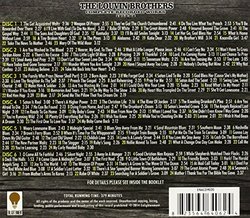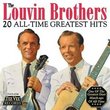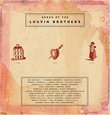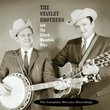| All Artists: The Louvin Brothers Title: Complete Recorded Works: 1952-62 (6CD) Members Wishing: 2 Total Copies: 0 Label: ENLIGHTENMENT Release Date: 8/12/2014 Album Type: Box set, Import Genres: Country, Pop, Rock Style: Number of Discs: 6 SwapaCD Credits: 6 UPC: 823564640624 |
Search - The Louvin Brothers :: Complete Recorded Works: 1952-62 (6CD)
 | The Louvin Brothers Complete Recorded Works: 1952-62 (6CD) Genres: Country, Pop, Rock
American country music duo The Louvin Brothers, composed of brothers Ira Lonnie Loudermilk (1924-1965) and Charlie Elzer Loudermilk (1927-2011) - better known as Ira and Charlie Louvin - were tagged the most influential ha... more » |
Larger Image |
CD Details
Synopsis
Product Description
American country music duo The Louvin Brothers, composed of brothers Ira Lonnie Loudermilk (1924-1965) and Charlie Elzer Loudermilk (1927-2011) - better known as Ira and Charlie Louvin - were tagged the most influential harmony team in the history of country music by the New York Times. But perhaps Emmylou Harris put it more succinctly; there was something scary and washed in the blood about the sound of the Louvin Brothers. They adopted the name Louvin Brothers in the 1940s as they began their career in gospel. They would soon move into secular music however, although many of their songs, often self-composed, were still heavily influenced by their Baptist faith and warned against sin. Despite this, Ira Louvin had a reputation for drinking, womanizing, and a volcanic temper. Ira was married four times; his third wife Faye shot him in the chest four times, and twice in the hand, after he allegedly tried to strangle her with a telephone cord. Although seriously injured, he survived (Faye is reported to have said, "if the bastard don't die I'll shoot him again!"). Often performing drunk, Ira would sometimes become angry on stage and smash his mandolin when unable to tune it - only to glue it back into one piece when sober. His style was heavily influenced by Bill Monroe, and he was considered one of the top mandolin players in Nashville. In 1963, fed up with Ira's drinking and abusive behavior, Charlie started a solo career. Ira Louvin died in 1965 at the age of 41 after a drunk-driver struck the vehicle he was driving head-on; his fourth wife Anne was also killed in the crash. Ironically, at the time of his death, a Drunk under the Influence arrest warrant had been issued for him. The more sober lifestyle of brother Charlie undoubtedly contributed to his long life, surviving as he did until 2011, passing on at age 83 after a lengthy battle with pancreatic cancer. This 6-disc compilation contains every recording the brothers released as a duo - from their very first single, the delightful Get Acquainted Waltz, right through to their 1962 album Weapon of Prayer released soon before they went their separate ways. There were numerous albums released retrospectively, many of which contained previously un-heard recordings, but it was the music that was issued during their tenure as a musical partnership that best represents the almighty influence this often troubled but always magnificent pair contributed to the Great American Country Music Songbook.
Similar CDs
| Flatt & Scruggs 7 Classic Albums Plus Genres: Folk, Pop Label: Imports | |

 Track Listings (23) - Disc #1
Track Listings (23) - Disc #1


